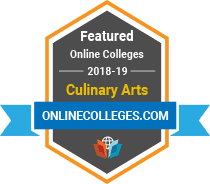Featured Online Colleges for Culinary Arts in 2018-19
It is rare to find a school that offers online degree programs in culinary arts. However, the two institutes featured here do in fact offer such programs, ranging from one-year certificates to bachelor's degrees. Students can use this list to find details about these accredited online colleges, where they can begin or advance their career options in the food service industry. We hope you enjoy perusing the highlights of our list of featured online colleges for culinary arts.
Visit our methodologies page to learn more about how we use official data to evaluate schools.
If you were looking for a more scientific approach to food, you can hop over to our Nutrition page and see if it is more aligned to your interests.
